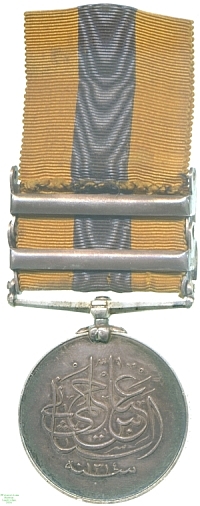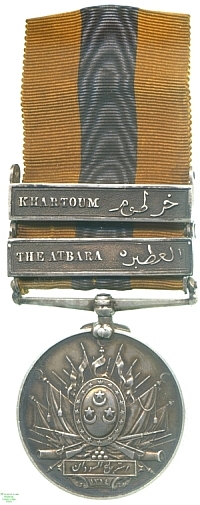
Obverse, the Arabic monogram of Khedive Abbas Hilmi II, with the Arabic date 1314 A. H. in the exergue

Reverse, an oval shield bearing three stars and crescents, before an array of crossed rifles, cannons and standards

Obverse, the Arabic monogram of Khedive Abbas Hilmi II, with the Arabic date 1314 A. H. in the exergue |

Reverse, an oval shield bearing three stars and crescents, before an array of crossed rifles, cannons and standards |
The recovery by Egypt of the Sudan, after its secession under Mahdist rebels in the 1880s, did not by any means mark the end of conflict in that province, which remained restless under an Egyptian control seen merely as a puppet for British imperialism. In fact combat was more or less endemic from 1896 to 1908 and beyond, and in 1897 the Egyptian Army obtained from the Khedive a new medal to be awarded for service in these campaigns. When finally replaced it had been issued with fifteen different bars, and without any bar for the earliest engagements that it covered.
The two crucial engagements of the war are marked by the bars awarded with this medal. The first was the Battle of the Atbara on 8 April 1898, in which Abdullah ibn Muhammad al-Taashi, the successor of the so-called Mahdi Muhammad Ahmad ibn al-Sayyid, was defeated by a British firepower that now included the new Maxim machine gun. Next, at the Battle of Omdurman on 2 September 1898, despite being outnumbered two-to-one by al-Taashi's forces, the Mahdists sustained casulaties totalling nearly half their force at the hands of the artillery, machine-guns and trained soldiery of the British and Egyptians, who lost not even fifty men killed and took total casualties of less than 500. For this battle the bar for Khartoum was awarded, and after it the Mahdist revolt, deprived of its capital, was effectively defeated. Al-Taashi was finally killed at the Battle of Umm Diwaykarat on 24 November 1899 and thereafter the province was officially considered reconquered, although extensive peace-keeping operations were still required.
This medal was awarded to Private F. Mackay of the 1st Battalion, Seaforth Highlanders. Lester Watson acquired it at some point before 1928.